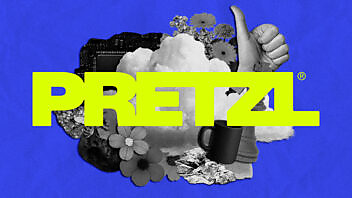By some definitions, marketing is the art of talking out of your ass and getting away with it.
When the people employed to lift boxes don’t lift boxes, there’s really nothing they can do to convince someone else that the boxes were moved. But when the people employed to communicate a value proposition deliver the wrong type of leads, it’s a little bit harder to explain why things went wrong.
Because in our world, the box is usually a metaphor. And as the very clever folk at Wieden and Kennedy put it – the cost of living in metaphor is eternal vigilance.
And buyer beware, because when that vigilance is lacking – the bullshit cometh.
Eternal vigilance and B2B tech marketing
So we work with some of the biggest, baddest mothers in tech. These are people making technology that’s so close to the cutting edge there usually isn’t even a name for what it does yet.
More importantly, there isn’t even a properly crafted metaphor yet. This makes our job as metaphor makers particularly important. Because when you’re marketing great tech, you’re usually condensing a great deal of complexity into pretty simple terms.
This means there’s a chance you could be reductive about the truth – I beg your pardon – this means there’s a chance for some bullshit. It might be because you’re top of the funnel, it might be because you’re avoiding jargon, but if you’re going ‘soft focus’, you’d better be willing to admit it.
The onus of communication
Because if we’re scared of another tech bubble hitting, we have to acknowledge our role as marketers in pumping it full of hot air. So if I’m selling a data product, and I decide to conflate its benefits with Big Data, I have a responsibility to make sure the metaphor isn’t a load of crap.
Now, when I say ‘a load of crap’ I don’t mean I shouldn’t fill it with words like dynamic and innovative. Our prospects are too smart for that kind of crap – I’d end up getting the boot long before I got a promotion.
No, when I say I have to make sure the metaphor isn’t a load of crap, what I mean is, I have to make sure the metaphor isn’t masking any of my misunderstandings. I have to navigate the treacherous valley of Dunning Kruger and make sure I’m not tucking my shoelaces instead of tying them.
Here’s why this is crucial.
The knowledge gap is widening
In the same way the rent in Silicon Valley is running away from normality, so too is the average level of knowledge. For every 100 people who understand what Hadoop is in the world of tech, there are (at least) 1000 people who don’t know what the hell a Hadoop is.
And as Arthur C. Clarke put it, any sufficiently advanced technology is indistinguishable from magic. On the face of it, this is wonderful. But if I tell those 1000 people that magical Hadoop turns unstructured data into structured data, they’re likely to believe me.
And if that statement is only partly true (which, by my understanding of things, it is) I’ll have gift-wrapped a lie that they’ll believe. They won’t believe it because they’re stupid. They’ll believe it because it’s easier to trust an analogy you understand, than a fact you can’t remember.
So when marketers don’t know what they don’t know, they need to read a fucking book.
—
No less than 12 times a day, I have to stop and realise I don’t know what the hell I’m writing about. Whenever I reach that point I have a choice – either I plough through and force fit an analogy – or I wade through the dark matter that is the stuff I don’t know I don’t know.
Option 2 is tough. But here’s why option 1 is practically criminal.
Every lie, misunderstanding and inaccurately conflated analogy is another puff of hot air into the tech bubble. It means the people who believe in magic, now have one more reason to distrust the magic. They don’t even know it yet, but this little nip and tuck of the truth’s going to bite them in the ass later.
Because inevitably when bubbles are building, there will be assholes to build (futures markets) on those lies (inappropriately valued commodities). When those lies are questioned or exposed (devalued/revalued) the whole system is suddenly rocking.
And that’s when the stories start.
- An inventor raises $300 million from various inventors – but no one’s really sure if he’s a genius or a conman.
- A Russian company crowd funds $1 million for a piece of tech claiming to read glucose levels through your skin – even after independent doctors publicly deride the science as junk, people continue to donate to it while the crowd funding platform, Indiegogo, plays dumb.
- After years of high frequency trading, no one fully agrees on who’s getting screwed and who’s doing the screwing.
All those stories have the same plot line of information asymmetry based on technology. None of them necessarily have anything to do with the kind of B2B tech marketing I work at but they indicate how thin the ice is.
And that scares the crap out of me. Maybe I’ve read too many Ben Horowitz war stories from 2001. Or maybe I’ve heard Doug and Stan not talk about those dark days too often. Maybe I’m just elbows deep in an ecosystem with a history of particularly loud ‘pops’.
Whatever the reason, I’m simultaneously convinced we aren’t in a bubble and petrified that my saying that is making the bubble bigger. The only thing I know for sure is that before the money bubble there is always a knowledge bubble and idiot marketers who think they’re here to sell fiction are going to screw the pooch for all of us.
And all I can do about it is try to make sure I’m no longer one of those idiot marketers. (And of course, write excessively long and rambling posts.) I just can’t stop thinking about Peter Thiel’s advice to Mark Zuckerburg after he gave him his first $500,000 in angel funding.
“Don’t fuck it up.”

Enjoyed this article?
Take part in the discussion








Comments
There are no comments yet for this post. Why not be the first?